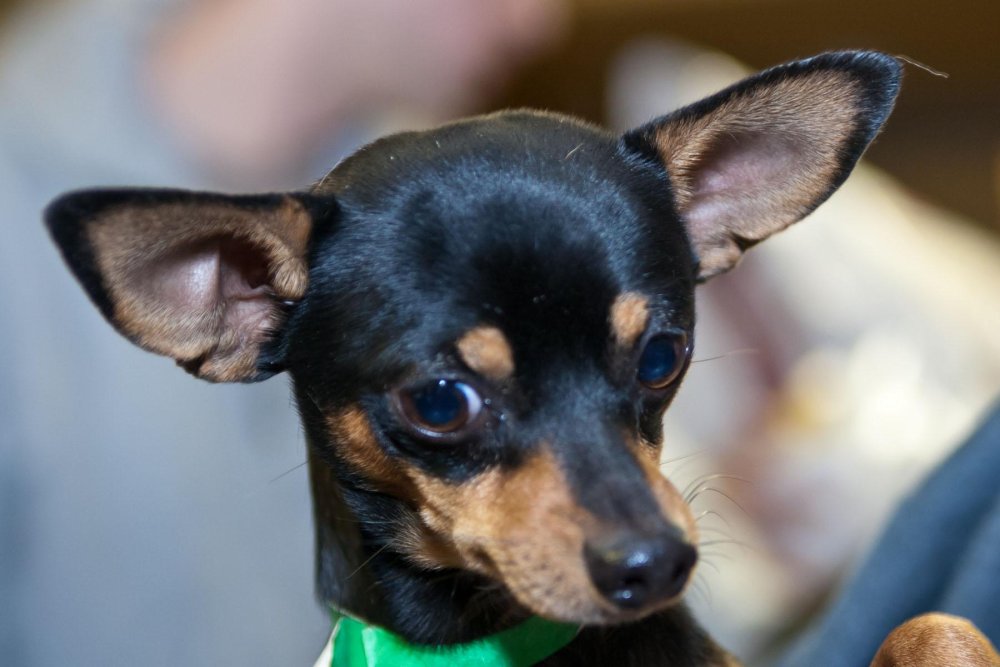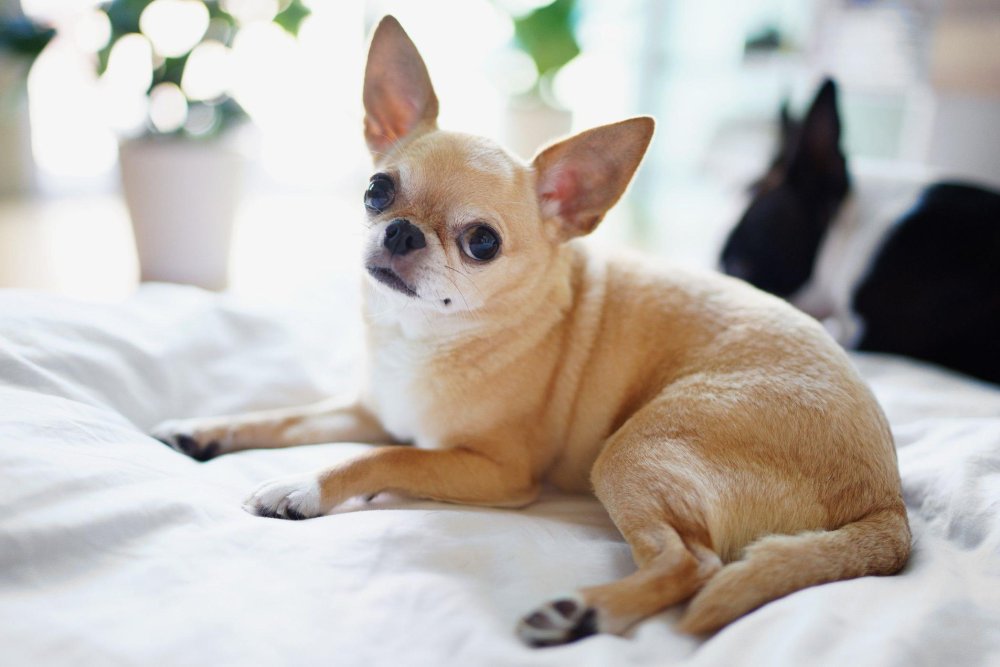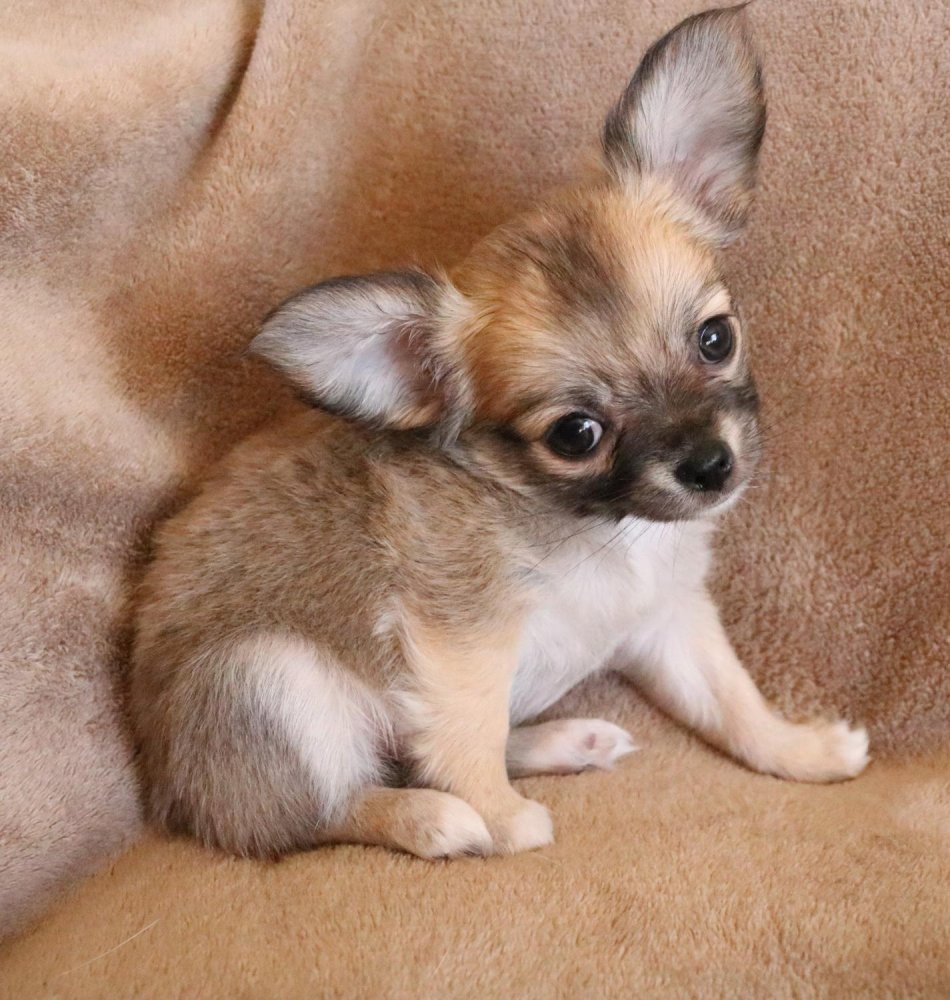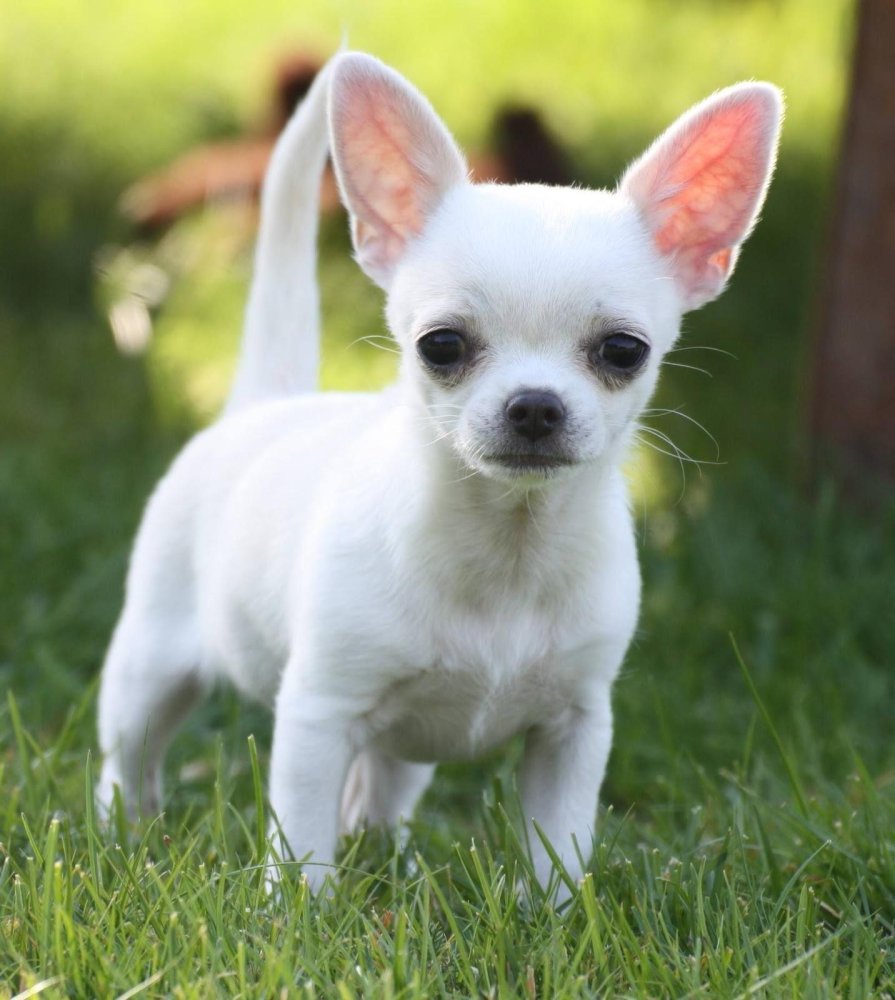- Breed Category: Toy
- Country of Origin: Mexico
- Average Height: 15-23 cm (6-9 inches)
- Average Weight: 1.5-3 kg (3-6.5 pounds)
- Average Life Span: 12-20 years
- Grooming Requirements: Low, occasional brushing
- Exercise Requirements: Low, short daily walks
- Coat Type: Smooth or long
- Coat Color Variations: Various, including fawn, black, white
- Shedding Level: Moderate
- Ear Type: Erect
- Tail Type: Curved over back
- Temperament: Alert, lively, devoted
- Intelligence Level: High
- Barking Tendency: High
- Compatibility with Children: Moderate, better with older children
- Compatibility with Other Pets: Moderate, socialisation needed
- Training Ease: Moderate, can be stubborn
- Common Health Issues: Patellar luxation, heart problems
- Dietary Needs: High-quality small breed diet
- Energy Level: Moderate
- Drooling Tendency: Low
- Sensitivity to Weather: High, sensitive to cold
- Overall Maintenance Level: Low
- Original Purpose: Companionship
- Year of Recognition by Kennel Clubs: 1904
- Famous Breed Representatives: Tinkerbell (Paris Hilton’s dog)
- Apartment Friendly: Yes
- Best Suited For: Singles, seniors, small families
- Cost of Ownership: Moderate
- Unique Traits: Smallest dog breed
- Cultural Significance: Symbol of Mexico
- Popularity Rank: High
Ever wondered what makes a Chihuahua tick? These tiny dogs pack a punch with their big personalities and unique traits. Known for their loyalty and sass, Chihuahuas are more than just a cute face. They have a rich history and specific care needs that every potential owner should know about.
Originating from Mexico, Chihuahuas are one of the smallest dog breeds, yet they have a long and fascinating history. Their lineage traces back to ancient times, and they’ve been cherished companions for centuries. But what really sets them apart is their spirited nature and adaptability.
In this article, we’ll dive into the characteristics that define the Chihuahua, explore their historical roots, and offer tips on how to care for these lively little dogs.
History and Cultural Significance of the Chihuahua

Early Development of the Breed
The Chihuahua’s journey begins in ancient Mexico, where they are believed to have descended from the Techichi, a small companion dog kept by the Toltec civilisation. Over time, these little dogs were refined and bred for their compact size and lively temperament. By the time the Aztecs came into power, the Chihuahua had already become a beloved pet, often associated with nobility and spiritual significance.
Role in Mexican Culture and History
Chihuahuas have played a significant role in Mexican culture, symbolising both companionship and mysticism. They were thought to guide souls to the afterlife, a belief that highlights their deep-rooted connection to spiritual practices. Even today, they are celebrated as a national treasure, embodying the vibrant spirit of Mexico.
Key Historical Figures and Events
The breed’s popularity surged in the late 19th and early 20th centuries, thanks in part to American tourists who discovered these charming dogs during their travels to Mexico. Notable figures, including celebrities and artists, have since embraced the Chihuahua, further cementing its status as a cultural icon. Their rise to fame is a testament to their enduring appeal and unique charm.
Physical Characteristics of the Chihuahua

Appearance
Chihuahuas are known for their petite size, often weighing between 1.5 to 3 kilograms. Despite their small stature, they carry themselves with a confident and alert posture. Their coat can vary significantly, ranging from smooth and short to long and flowing. Colours are diverse, including fawn, black, white, chocolate, and even a mix of these shades. Some Chihuahuas sport distinctive markings, like masks or spots, adding to their unique charm.
Unique Physical Traits
One of the most striking features of a Chihuahua is its large, expressive ears, which stand erect and give them an alert appearance. Their eyes are another standout trait—big, round, and full of expression, often conveying a sense of curiosity and intelligence. Despite their tiny size, Chihuahuas have a surprisingly sturdy build, with a well-proportioned body that allows them to move with agility and grace.
Temperament and Behaviour of the Chihuahua

Typical Personality Traits
Chihuahuas are known for their loyalty and alertness. These little dogs are often fiercely devoted to their owners, forming strong bonds that make them excellent companions. Despite their small size, they have a high energy level and a bold personality, often acting as if they are much larger than they really are. This confidence can sometimes come across as sassiness, but it’s all part of their charm.
Suitability as a Family Pet and Companion Dog
Chihuahuas can make wonderful family pets, especially for those who appreciate their spirited nature. They thrive in environments where they receive plenty of attention and affection. Their small size makes them suitable for apartment living, but they still need regular exercise and mental stimulation to keep them happy and healthy.
Interaction with Children and Other Animals
When it comes to children, Chihuahuas can be great playmates, but supervision is key. Their small size makes them vulnerable to rough handling, so teaching kids how to interact gently is important. With other animals, Chihuahuas can be a bit territorial, but with proper socialisation, they can learn to get along well with other pets.
Training and Exercise Needs for Chihuahuas

Importance of Early Training and Socialisation
Getting a head start on training and socialisation is crucial for Chihuahuas. These little dogs have big personalities, and early exposure to different environments, people, and other animals helps them grow into well-rounded companions. It’s all about setting the stage for a confident and friendly adult dog.
Recommended Training Techniques
Positive reinforcement is the way to go with Chihuahuas. They respond well to treats, praise, and playtime as rewards. Keep training sessions short and fun to hold their attention. Consistency is key, so make sure everyone in the household is on the same page with commands and rules.
Daily Exercise Requirements and Activities They Enjoy
Despite their small size, Chihuahuas need regular exercise to stay healthy and happy. A couple of short walks each day, along with some playtime, usually does the trick. They love games like fetch or tug-of-war and enjoy exploring new places. Just remember, their tiny legs mean they tire out faster than larger dogs, so keep an eye on their energy levels.
Health and Lifespan of the Chihuahua

Common Health Issues
Chihuahuas, like many small breeds, can face specific health challenges. Dental issues are common due to their tiny mouths, so regular teeth cleaning is a must. They can also be prone to patellar luxation, where the kneecap slips out of place, and heart problems like mitral valve disease. Keeping an eye on their weight is crucial, as obesity can exacerbate these conditions.
Average Lifespan and Health Tips
With proper care, Chihuahuas can live between 12 to 20 years, making them one of the longer-lived dog breeds. To ensure they reach their golden years in good health, a balanced diet and regular exercise are essential. Routine vet check-ups will help catch any potential issues early, keeping your Chihuahua in tip-top shape.
Preventative Care Recommendations
- Regular dental care: Brush their teeth frequently and provide dental chews.
- Weight management: Monitor their diet and avoid overfeeding.
- Joint health: Consider supplements if recommended by your vet.
- Vaccinations and parasite control: Keep up with their vaccination schedule and use flea and tick preventatives.
Grooming and Maintenance for Chihuahuas

Coat Care and Grooming Routines
Chihuahuas come in two coat types: smooth and long. Each requires a slightly different grooming approach. Smooth-coated Chihuahuas benefit from a weekly brush to remove loose hairs and keep their coat shiny. Long-coated ones need more frequent brushing, ideally a few times a week, to prevent tangles and mats. Regular grooming not only keeps them looking their best but also helps in spotting any skin issues early.
Shedding and Seasonal Grooming Tips
While Chihuahuas are relatively low shedders, they do experience seasonal shedding, usually in spring and autumn. During these times, increase the frequency of brushing to manage the extra hair. A good bath every month or so can also help control shedding and keep their coat healthy. Always use a dog-specific shampoo to avoid skin irritation.
Regular grooming sessions are a great opportunity to check for any unusual lumps, bumps, or parasites. Keeping up with these routines ensures your Chihuahua stays comfortable and healthy all year round.
Diet and Nutrition for Chihuahuas

Nutritional Needs for Optimal Health
Chihuahuas may be small, but their nutritional needs are mighty. A balanced diet rich in high-quality proteins, healthy fats, and essential vitamins is crucial for their overall health. Look for dog foods that list meat as the first ingredient and avoid those with fillers like corn or soy. Omega-3 and omega-6 fatty acids are also important for maintaining a healthy coat and skin.
Foods to Include and Avoid
Include lean meats, fish, and vegetables in their diet. These provide the necessary nutrients without unnecessary calories. Avoid foods high in salt, sugar, and artificial additives, as these can lead to health issues. Also, steer clear of chocolate, onions, and grapes, which are toxic to dogs.
Feeding Schedules and Portion Recommendations
Chihuahuas have fast metabolisms, so feeding them small, frequent meals is ideal. Aim for two to three meals a day, depending on their age and activity level. Portion control is key to preventing obesity, so follow the guidelines on your dog food packaging and adjust as needed based on your vet’s advice.
Fun Facts and Trivia About Chihuahuas

Interesting Tidbits About the Breed
Chihuahuas are not just known for their size; they hold the title for the smallest dog breed in the world. Despite their tiny stature, they have a heart full of courage and often act as if they’re much larger than they are. These little dogs are also known for their long lifespan, often living well into their teens, which is quite impressive for a dog.
Another fun fact is that Chihuahuas have a unique “apple head” shape, which is a distinctive feature of the breed. This gives them their characteristic large, round eyes and a slightly domed skull. They also have a “deer head” variety, which has a more elongated face and larger ears.
Famous Chihuahuas in Media or History
Chihuahuas have made their mark in pop culture, with several famous ones gracing our screens. Remember Bruiser Woods from the “Legally Blonde” movies? This fashionable pup stole the show alongside Reese Witherspoon. Then there’s Gidget, the Taco Bell Chihuahua, who became an advertising icon in the late ’90s with her catchy phrase, “¡Yo quiero Taco Bell!”
In history, Chihuahuas have been the companions of many notable figures, including Marilyn Monroe and Paris Hilton, who helped popularise the breed in modern times. Their presence in the limelight has only added to their charm and appeal, making them a favourite among dog lovers worldwide.
Final Thoughts
Chihuahuas are small dogs with big personalities and rich histories. Their unique traits and spirited nature make them beloved companions worldwide. While they require specific care and attention, the rewards of owning a Chihuahua are immense, offering loyalty and joy to their families. Embracing their cultural significance and understanding their needs can lead to a fulfilling relationship with these charming dogs. Consider adopting a Chihuahua to experience the vibrant spirit they bring into a home.
